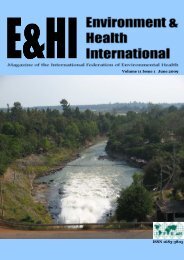IFEH ISSUE 6 - International Federation of Environmental Health
IFEH ISSUE 6 - International Federation of Environmental Health
IFEH ISSUE 6 - International Federation of Environmental Health
- No tags were found...
Create successful ePaper yourself
Turn your PDF publications into a flip-book with our unique Google optimized e-Paper software.
the National <strong>Health</strong> Training Centre (Lesotho). Keraka (Kenya) was invited by Kitagwa (Kenya) to act<br />
as external examiner for the degree programme at Moi University and is also the external examiner for<br />
the newly established degree programme at Mount Kenya University. Van der Westhuizen (South<br />
Africa) has been invited to be external examiner for the new degree programme at the Polytechnic <strong>of</strong><br />
Namibia by Jansen (Namibia). Musoke (Uganda) has been appointed as a visiting lecturer at Kigali<br />
<strong>Health</strong> Training Institute (Rwanda). Grimason has acted as external examiner for the degree<br />
programme at the Polytechnic (Malawi). Very little collaboration between African academics existed<br />
before the establishment <strong>of</strong> the Academy, which is a step forward in the right direction.<br />
Research<br />
Another objective <strong>of</strong> the project was to promote and facilitate collaborative environmental health<br />
research in SADC countries. Universities and academics in Africa face many challenges and<br />
constraints when it comes to undertaking environmental health research e.g. lack <strong>of</strong> well-equipped and<br />
accredited laboratories, limited technical support, government / university funding etc. As a result,<br />
most studies generally gather empirical evidence using observational, questionnaire / focused group<br />
discussions which is important in the field <strong>of</strong> environmental health. The uniqueness <strong>of</strong> EH research is<br />
that it provides a bridge between the physical and social sciences and facilitates a better understanding<br />
<strong>of</strong> the environment and health. However, evidence from the questionnaire study conducted by<br />
Engelbrecht would suggest that most academics involved with the delivery <strong>of</strong> EH programmes in<br />
Africa are recruited for teaching purposes rather than research. Feedback from the workshops would<br />
suggest that most academics lack essential research skills and knowledge e.g. on proposal writing and<br />
paper writing. As a result many struggle to publish their results in peer-reviewed scientific journals.<br />
Often the results <strong>of</strong> fascinating studies unique to EH are published in national medical and/or<br />
pr<strong>of</strong>essional journals which are not highly regarded by the University promotion committees and are<br />
not necessarily available to the world-wide EH community.<br />
During the recent workshop in Cape Town, Norman, Ana, Musoke and Lungu presented on EH in<br />
their respective countries. Interestingly, many <strong>of</strong> them presented photographic evidence <strong>of</strong> the<br />
insanitary conditions facing the poorest members <strong>of</strong> society in each country – different countries but<br />
similar problems. We know what the problems are but how do we generate the statistical data to<br />
bridge the photographic evidence with empirical evidence to provide the scientific evidence to<br />
convince Ministries <strong>of</strong> <strong>Health</strong> to develop/adopt/apply environmental health policies and strategies and<br />
drive home the message that prevention is better (and more cost effective) than cure? However, one <strong>of</strong><br />
the speakers did add another dimension to this dilemma “there is a clear lack <strong>of</strong> will by most<br />
politicians and Governments in Africa to adequately address these issues … it is within their control to<br />
do so if they were seriously interested … they see the same things that we do on a daily basis, come<br />
on, get real!”<br />
With respect to the objectives <strong>of</strong> this grant, we have attempted to address this issue by helping (i)<br />
academics obtain Commonwealth academic research scholarships to undertake M. Phil and PhD<br />
studies (n = 6), (ii) EH practitioners obtain Commonwealth pr<strong>of</strong>essional scholarships to develop<br />
pr<strong>of</strong>essional practice and institutions (n =2), (iii) run proposal writing courses at Strathclyde<br />
University, UK (March 2010), University <strong>of</strong> Johannesburg, South Africa (July 2010) and Kenyatta<br />
University, Kenya (October 2011), and (iv) undertake collaborative research and produce publications<br />
in pr<strong>of</strong>essional and peer-reviewed scientific journals (see reference section). At the penultimate<br />
workshop, the Academy also received a proposal from Dr. Caradee Wright, Council for Scientific and<br />
48



